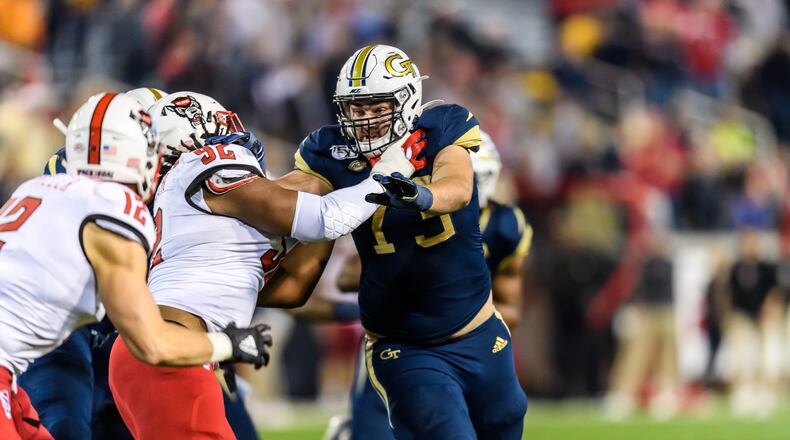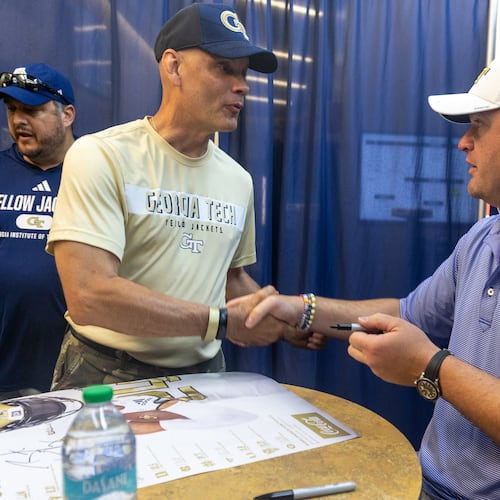In January, Zach Quinney was a football player and graduate student at Georgia Tech. He had started the previous three seasons at left tackle for the Yellow Jackets and planned to compete to do so for a fourth season this fall.
After completing his business degree in December, he was enrolled in a master’s degree program in the school of building construction. And then a phone call came out of the blue measuring his interest in a job opening that was highly tempting.
“I didn’t know what I was going to do,” Quinney told the AJC. “I wanted to play again, but at the same time, I was pretty beat up.”
This week, as the Jackets progress through their third week of spring practice, Quinney has been going through his own training, learning to manage logistics and operations for railway facilities for Norfolk Southern. After completing training, he’ll head to Charleston, S.C., to begin his professional career as an assistant operations manager. Protecting quarterback Jeff Sims’ blind side has given way to ensuring that shipping containers make it onto the appropriate truck beds.
“Walking into grocery stores, somebody would see me and say, ‘Oh, you must play football,’” Quinney said. “Now I have to say, ‘Oh, well, I used to.’ So that’s been different. But I’m starting to get used to it.”
It is not every college football player who would voluntarily surrender a starting spot on a power-conference team, and with it any shot at the NFL. But Quinney’s decision serves as a reminder that there is far more to each player than what is visible in 12 Saturdays in the fall.
Quinney’s health was a factor. Last year, he tore the ligament in his thumb against Louisville, the fourth game of the season. He chose to play with the injury for another three games and then had surgery during the team’s open week. The back-to-back postponed games gave him extra time to recover, and he played with his thumb in a cast for the rest of the season.
The previous season, he injured his wrist in preseason camp and chose to play through it, starting all 12 games before having surgery at the end of the season.
“None of those were career-ending injuries or anything,” Quinney said. “I definitely could have kept playing, but my body just wasn’t feeling too good.”
He weighed the toll that football was taking on his body and the fact that, while he had dreamed of playing professionally, “I’m not one of those guys where it’s ‘NFL or bust,’” Quinney said.
On top of that, the job was appealing. Quinney interned in 2019 with a rail terminal operator (ITS ConGlobal) that works with Norfolk Southern. From classes, Quinney had an interest in operations and logistics, and the internship confirmed it.
“From that point on, I knew that that’s really what I wanted to do,” Quinney said. “So when (Norfolk Southern) reached out to me about this job, I had to take it.”
Further, the salary “is more than I would expect,” Quinney said.
Still, he called it a stressful decision. He had played football since he was 6 years old, he said, eventually becoming a two-time all-state lineman at Savannah Christian Prep and then playing for the Jackets, first for Paul Johnson and then Geoff Collins. A starter in Tech’s past 34 games, Quinney was not a star, but played with consistent effort and was a leader. He was voted one of the team’s four captains at the end of the 2020 season.
Because of the NCAA’s granting fall- and spring-sport athletes with an extra season of eligibility, Quinney actually could have played two more seasons and become a rare five-year starter, although he said that he likely would have completed his Tech career in the 2021 season had he stayed.
“I love football,” he said. “I love everything about it. The main thing was just my teammates, and in particular the offensive-line (meeting) room. There’s really just something special about all of us, and we’re really, really, really close. I’m still in touch with everybody. But having to leave and not getting to sit in the meetings and get all the inside jokes and everything, that’s probably been the hardest part.”
Quinney said he prayed over the decision a lot.
“I think in the back of my head, I knew that’s what I wanted to do as soon as (Norfolk Southern) called me, but it was just that change that was scary,” Quinney said. “After I prayed on it for a while, I decided that it was what’s best for me, so that’s what I decided to do.”
Quinney informed coaches of his decision at the beginning of February and left school, returning home to Savannah before coming back to Atlanta to begin his job training.
Quinney played at 305 pounds, a weight propped up by an extremely high-calorie diet. This week, he said he was around 270 pounds and expected his weight to keep dropping.
“That’s the best part about all of this,” he said. “I don’t have to keep eating.”
His favorite game – the 49-28 win over Virginia Tech in 2018 in Blacksburg, Va., when the Jackets rushed for 465 yards, including 215 by then-quarterback Tobias Oliver.
“My first year starting and going up on Thursday night and playing them and beating them, and the crowd was absolutely insane,” Quinney said. “That was my favorite memory of a game, for sure.”
A next chapter awaits, one with no insane crowds, but with a steady paycheck and presumably little chance of torn thumb ligaments.
About the Author
Keep Reading
The Latest
Featured



